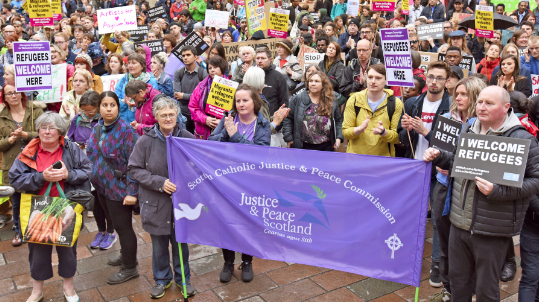BY No Author | August 2 2019 | ![]() 0 COMMENTS
0 COMMENTS ![]() print
print

Activists plead with Church to shelter evicted refugees
Publication Date: 2019-08-02
Catholic charities predict spike in the number of homeless people due to Serco lock evictions — by Peter Diamond and Ryan McDougall
Catholic human rights campaigners have written to the Archbishop of Glasgow asking for asylum seekers affected by Serco’s lock-change evictions to be temporarily housed in disused Church property.
Justice and Peace (J&P) Scotland’s Glasgow group, the Society of St Vincent de Paul (SSVP) Glasgow, and Marian Action have all responded to the news that Serco, who change locks on behalf of the Home Office, have begun evicting up to 30 people a week.
Creating homeless
Currently, there are about 300 asylum seekers in the city housed by Serco and the lock changes will effectively render many of them homeless.
The controversial lock changes are titled the ‘move on protocol’ by the UK Home Office, and aim to see those who have been refused asylum return to their home countries, from which many asylum seekers have fled due to factors such as war and persecution.
Marian Action, J&P and SSVP Glasgow have since written a letter to Archbishop Philip Tartaglia of Glasgow asking for support.
Destitution
The letter states that the steps to evict ‘will be taken in the full knowledge that there is insufficient alternative shelter or accommodation available in the city to provide safe and secure housing’ to the vulnerable group.
It adds: “People seeking asylum in the UK are prohibited from accessing homelessness services and do not have the resources to fund their own accommodation.
“These men and women now face the terrifying prospect of being forced into street homelessness and destitution, with all the inherent dangers this brings.
Inhumane
“The people currently threatened with eviction are seeking protection in the UK, having fled war and persecution in their home countries. Forcing already vulnerable people into destitution is inhumane.
“Mindful of our calling to welcome the stranger, we write to you to ask that those who are left homeless because of this be accommodated temporarily in Church properties within the archdiocese. There are some empty parish houses, for example, that could perhaps be used in this way.”
Dorothy MacLean, chair of J&P Glasgow, said their motivation to help comes by the Gospel message of Matthew 25:5: “I was a stranger and you made me welcome.”
Pope Francis
She said: “On May 27 this year, Pope Francis wrote in his message for the World Day of Migrants and Refugees: ‘Our response to the challenges posed by contemporary migration can be summed up in four verbs: welcome, protect, promote, integrate.’”
In response, Archbishop Tartaglia has written to home secretary Priti Patel, stating the measure is ‘regrettable and harsh.’
He added: “I appeal to you not to make refugees and asylum seekers homeless, but to provide for them decent accommodation in accordance with their human dignity and human rights.”
To date, at least two men have contacted the Scottish Refugee Council stating their locks have been changed.
Patrick Grady, Catholic SNP MP for Glasgow North, claimed those responsible must find a solution that does not see those at risk ‘destitute on our streets.’
Extremely distressing
He called the evictions ‘extremely distressing’ for the asylum seekers, adding: “I know many of the churches in Glasgow provide support and outreach to refugees and asylum seeking members of our communities, and our parishes are richer for the diversity and experience they bring.
“The different agencies, city council, charities, and the Home Office need to work together to find a solution that does not leave people who have fled some of the most dangerous countries in the world on our streets.”
People of Faith
Many of the asylum seekers living in Glasgow are devout Catholics, with Immaculate Conception Church in Maryhill having many parishioners who are seeking asylum in the city.
Parish priest of St Mary’s, Fr Jim Lawlor, said: “None of our families have been evicted yet, thankfully, but a couple of our families have been forcibly moved because they don’t have any stability or say in where they get to stay. They can just be told ‘you’re moving from here to there.’
“One of our families was fairly settled and had their kids in school—one of the kids has special needs—but they were moved away and the child now has to be taken across the city in a taxi to get to school in the mornings.
“That’s just one anecdote, but it illustrates what’s happening across the city. The vast majority of Glasgow will be raging about this.”
Charitable support
The Wayside Club, a charity run by the Legion of Mary in the city centre of Glasgow offers a safe place for the city’s homeless each night of the year, providing food, a hot shower and practical support.
Jim White, secretary of The Wayside Club said the asylum seekers would be welcomed by them, and anticipates a spike in the number of people they are currently helping due to the lock changes.
“They’ll have to survive, and I think they’ll eventually find out about places like us and get to know what we do, so I’m expecting an increase in our numbers,” he said.
“Making people homeless should be a criminal offence as far as I’m concerned.
“The council is obliged to make sure there’s no such thing as a homeless person but here they are.
“We don’t ask their condition, or even their name; we just accept them and they will be welcomed.
“If they want to tell us their circumstances and want some advice we’ll give it to them, but we’re not here to solve the world’s problems; we’re here to help those who suffer from them.”
Serco
Julia Rogers, Serco’s managing director for immigration, stressed they ‘very much regret the distress’ the evictions will cause. The company has also made £150,000 available for Glasgow homeless charities.
A spokesperson for the Home Office said: “The UK only ever returns those who both the Home Office and the courts are satisfied do not need our protection and have no legal basis to remain in the UK.
“Together with charities we have engaged with every individual affected over a number of months to provide advice and guidance on the support available and the voluntary returns process.”










